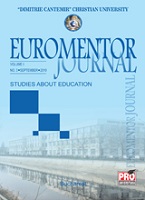ESP THROUGH THE LENS OF REFLEXIVE PEDAGOGY: ADVANTAGES AND DISADVANTAGES
ESP THROUGH THE LENS OF REFLEXIVE PEDAGOGY: ADVANTAGES AND DISADVANTAGES
Author(s): Irina BocianuSubject(s): School education, Higher Education , Health and medicine and law, Sociology of Education, Distance learning / e-learning, Pedagogy
Published by: Editura Pro Universitaria
Keywords: didactic pedagogy; reflexive pedagogy; e-learning ecologies; ESP; technology;
Summary/Abstract: During the COVID19 pandemics, teaching/learning/testing have undergone lots of changes made for the transition to online classes. Teaching English for Specific Purposes (ESP) online witnessed a paradigm shift and new approaches that were all facilitated by the use of technology have been developed or improved. Pre-pandemics, Bill Cope and Mary Kalantzis proposed “reflexive pedagogy” based on the idea that it is not the technology used that matters but the pedagogy itself which makes the difference, so they proposed reflexive pedagogy as opposed to didactic pedagogy which is composed of 7 affordances ranging from ubiquitous learning to differentiated learning with the purpose of moving focus from mimetic learning to epistemic learning via reflection and use of technology. Having this new approach in mind, the present paper attempts to analyse the advantages and disadvantages when teaching English for Specific Purposes. While the advantages are numerous due the possibility to use technology anytime, anywhere, anyhow, there are still certain constraints regarding learning foreign languages which utilize the mimetic approach in certain circumstance. Thus, the study focuses on the activities developed with the students from the University of Bucharest enrolled in the Faculty of Chemistry, approaching a wide range of subjects with a review of reflexive pedagogy in terms of advantages and disadvantages for ESP. While reflexive pedagogy is extensively useful for listening, speaking, reading and learning specialized vocabulary, writing seems to be affected as a way of progressing in learning. As an overall observation, reflexive pedagogy proves quite useful for teaching foreign languages with certain drawbacks.
Journal: Euromentor Journal - Studies about education
- Issue Year: XIII/2022
- Issue No: 4
- Page Range: 58-78
- Page Count: 21
- Language: English

